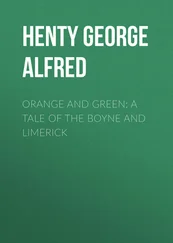George Henty - The Young Colonists - A Story of the Zulu and Boer Wars
Здесь есть возможность читать онлайн «George Henty - The Young Colonists - A Story of the Zulu and Boer Wars» — ознакомительный отрывок электронной книги совершенно бесплатно, а после прочтения отрывка купить полную версию. В некоторых случаях можно слушать аудио, скачать через торрент в формате fb2 и присутствует краткое содержание. Жанр: foreign_prose, foreign_children, на английском языке. Описание произведения, (предисловие) а так же отзывы посетителей доступны на портале библиотеки ЛибКат.
- Название:The Young Colonists: A Story of the Zulu and Boer Wars
- Автор:
- Жанр:
- Год:неизвестен
- ISBN:нет данных
- Рейтинг книги:4 / 5. Голосов: 1
-
Избранное:Добавить в избранное
- Отзывы:
-
Ваша оценка:
- 80
- 1
- 2
- 3
- 4
- 5
The Young Colonists: A Story of the Zulu and Boer Wars: краткое содержание, описание и аннотация
Предлагаем к чтению аннотацию, описание, краткое содержание или предисловие (зависит от того, что написал сам автор книги «The Young Colonists: A Story of the Zulu and Boer Wars»). Если вы не нашли необходимую информацию о книге — напишите в комментариях, мы постараемся отыскать её.
The Young Colonists: A Story of the Zulu and Boer Wars — читать онлайн ознакомительный отрывок
Ниже представлен текст книги, разбитый по страницам. Система сохранения места последней прочитанной страницы, позволяет с удобством читать онлайн бесплатно книгу «The Young Colonists: A Story of the Zulu and Boer Wars», без необходимости каждый раз заново искать на чём Вы остановились. Поставьте закладку, и сможете в любой момент перейти на страницу, на которой закончили чтение.
Интервал:
Закладка:
Among those whom Mr Humphreys’ decision to emigrate had much moved was Mr Jackson. He was not in so good a position, as he did not farm his own land; but he had sufficient capital to start him well in the colony, where a farm can be bought outright at a few shillings an acre. He talked the matter over with his friend on several occasions, and at last said —
“Well, I think I have pretty well made up my mind; the doctor is telling me that my poor little chap is not likely to live long; his mother is wrapped up in him, and will never like the place again; – so I think on all grounds a change will be good. I can’t come out with you, because I have got a lease of the farm; but I fancy that it is worth more than it was when I took it, and if I can get a good tenant to take it off my hands I don’t suppose the landlord will make any objections. I shall look about at once, and, when my poor little chap is gone, I shan’t be long before I come after you. You will let me know how you find the place, and whether these book-accounts are true? – I have heard that many of these chaps who write books are awful liars. I should like to get a farm as near you as may be.”
It was early in the spring when Mr Humphreys and his party embarked at Plymouth in the Dunster Castle . The farm had sold well, and Mr Humphreys possessed a capital of several thousand pounds – a sum which would make him a rich man in the colony. None of the party had ever seen the sea before, and the delight of the two boys and the wonderment of the labourers at all they saw was very great. Mr Humphreys had taken first-class passages for himself and family, while the others of course were steerage passengers.
Chapter Three.
The Farm
The voyage to the Cape passed without any incident whatever. The weather was fine the whole distance. Without even a single storm to break the monotony they touched at Capetown and Port Elizabeth, and at last arrived at Durban. The journey had not been too long for the boys; everything was so perfectly new to them that they were never tired of watching the sea and looking for porpoises and the shoals of fish, over which hovered thousands of birds.
Once or twice they saw a whale spout, while flying-fish were matters of hourly occurrence. They had prodigious appetites, and greatly enjoyed the food, which was altogether different to that to which they had been accustomed. They had stopped at Madeira and St Vincent, where great stocks of delicious fruit had been taken on board. Altogether they were quite sorry when they arrived at the end of the voyage.
The landing was effected in large boats, as the Dunster Castle drew too much water to cross the bar at the mouth of the harbour.
They stopped only one day at Durban, where Mr Humphreys hired a waggon to take the party to Pieter-Maritzburg, the capital. He was not encumbered with baggage, as he had decided to buy everything he wanted in the colony.
“You may pay dearer,” he said, “no doubt; but then you get just what you want. If I were to take out implements, they might not be suited to the requirements of the country. As for clothes, they would of course be pretty much the same everywhere; still, it is better to take out only a year’s requirements and to buy as we want, instead of lumbering over the country with a quantity of heavy baggage.”
The party were greatly amused at their first experience of a Cape waggon; it was of very large size, massively built, and covered with a great tilt; and it was drawn by sixteen oxen, spanned two by two. This was an altogether unnecessary number for the weight which had to be carried, but the waggon had come down loaded from the interior, and Mr Humphreys therefore paid no more than he would have done for a waggon with a small number of oxen. They took two days to accomplish the journey, the women sleeping at night in the waggon, and Mr Humphreys and his sons in blankets on the ground.
The driver, who was an Englishman, had been many years in the colony, and from him, upon the road, Mr Humphreys gained much valuable information about the country. The driver was assisted by two Kaffirs, one of whom walked ahead of the leading cattle, the other alongside, shouting and prodding them.
The boys were astonished at the power and accuracy with which the driver whirled his whip; this had a short handle and a lash of twenty yards long, and with it he was able to hit any animal of the team with absolute certainty, and indeed to make the thong alight on any part of their bodies at which he aimed.
On their arrival at Pieter-Maritzburg Mr Humphreys hired a house, and here he placed his party while he set to work to make inquiries after a suitable location. He soon heard of several places which seemed suitable, and having bought a horse started for Newcastle, a small town situated close to the frontier-line between the Transvaal and Natal.
He was away for three weeks, and on his return informed his wife that he had purchased a farm of 2000 acres, with a substantial farmhouse, at a distance of ten miles from Newcastle, for the sum of 1500 pounds.
The farmhouse was already roughly furnished, but Mr Humphreys purchased a number of other articles, which would make it comfortable and home-like. He laid in a great stock of groceries, and then hiring a waggon, similar to that in which they had before travelled, started with his party for the farm, having also hired four Kaffirs to assist there. Travelling by easy stages, it took them twelve days to get to Newcastle. The country was undulating and the road rose steadily the whole distance.
Near Pieter-Maritzburg the population was comparatively thick. The fields were well cultivated and the vegetation thick and luxuriant, but as they ascended the character of the country changed. Vast stretches of rolling grass everywhere met the eye. This was now beautifully green, for it was winter. In the summer and autumn the grass becomes dry and burnt up; fire is then applied to it, and the whole country assumes a black mantle. But the first shower of rain brings up the young grass and in a very short time the country is covered with fresh verdure.
Mr Humphreys told his wife that, before fixing on the farm, he had ridden into the Transvaal, and found that land could be purchased there even more cheaply than in Natal; but that he had much conversation with English settlers on the frontier, and these had for the most part strongly advised him to settle inside the Natal frontier.
“It may be that all will be right,” one had told him, “but the Boers have not yet recovered from their scare from Secoceni.”
“Who is Secoceni, father?” Dick asked. “The books we have say nothing about him.”
“No,” Mr Humphreys said; “they were all published a few years since, and none of them treat much of the affairs of the Transvaal, which, as an independent state, had comparatively little interest to English settlers. There are in the Transvaal, which is of immense extent, a very large number of natives, enormously outnumbering the Boers. In the southern districts, where the Boers are strongest, they cruelly ill-treat the natives, making slaves of them, and thinking no more of shooting one of them down than they would of shooting a dog. In the outlying provinces they live almost on sufferance of the natives, and, were these to unite their forces and rise, they could annihilate the Dutch. Secoceni is a powerful chief, who lives with his tribe in a natural stronghold; he has always held himself as independent of the Dutch. As his men used to make raids upon the Boers’ cattle, the latter attacked him, and in alliance with Swazis, another powerful tribe, endeavoured to carry his fortress; they were, however, badly beaten; it being only by the gallantry of their native allies that the Boer contingent was saved from destruction. Secoceni then took the offensive. A perfect panic seized the Boers; they refused to obey the orders of their government, and to turn out to resist the invaders. The treasury was empty, for their government had never been enabled to persuade them to pay taxes. They applied for aid to Natal, but finally their plight was so bad that they were glad to accept the offer which Mr Shepstone made them, of annexation to England, by which they secured our protection and were safe from annihilation. Secoceni was not the only enemy who threatened them. They had a still more formidable foe in the Zulus on the eastern frontier. These are a very warlike people, and it was known that their king meditated the conquest of the Transvaal. But, glad enough as the Boers were at the moment to accept the protection of England, now that the danger is over a great many of them would like to kick down the bridge which has helped them over the stream. They make no secret of their dislike to Englishmen, and although they are glad enough to sell their land at prices immensely in advance of the former value, for indeed land was previously almost unsaleable in the Transvaal, they are on bad terms with them. One of my informants describes them as a sullen, sulky people, and predicts that sooner or later we shall have trouble with them; so I thought it better altogether to pay a little higher for my land, and to be within the boundaries of this colony.”
Читать дальшеИнтервал:
Закладка:
Похожие книги на «The Young Colonists: A Story of the Zulu and Boer Wars»
Представляем Вашему вниманию похожие книги на «The Young Colonists: A Story of the Zulu and Boer Wars» списком для выбора. Мы отобрали схожую по названию и смыслу литературу в надежде предоставить читателям больше вариантов отыскать новые, интересные, ещё непрочитанные произведения.
Обсуждение, отзывы о книге «The Young Colonists: A Story of the Zulu and Boer Wars» и просто собственные мнения читателей. Оставьте ваши комментарии, напишите, что Вы думаете о произведении, его смысле или главных героях. Укажите что конкретно понравилось, а что нет, и почему Вы так считаете.












